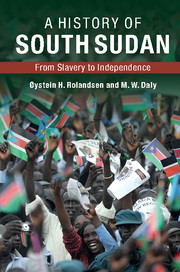Book contents
- Frontmatter
- Contents
- Preface
- Chronology
- List of abbreviations and Arabic terms
- Map
- 1 Introduction: the land and peoples of the upper Nile
- 2 Ivory and slaves: the nineteenth century
- 3 The second Turkiyya, 1898–1953
- 4 The curse of colonial continuity, 1953–1963
- 5 The first civil war, 1963–1972
- 6 Regional government: from one civil war to another, 1972–1983
- 7 Eclipsed by war, 1983–1991
- 8 Factional politics, 1991–2001
- 9 Making unity impossible, 2002–2011
- 10 Independent South Sudan
- Bibliographical essay
- Index
5 - The first civil war, 1963–1972
Published online by Cambridge University Press: 05 June 2016
- Frontmatter
- Contents
- Preface
- Chronology
- List of abbreviations and Arabic terms
- Map
- 1 Introduction: the land and peoples of the upper Nile
- 2 Ivory and slaves: the nineteenth century
- 3 The second Turkiyya, 1898–1953
- 4 The curse of colonial continuity, 1953–1963
- 5 The first civil war, 1963–1972
- 6 Regional government: from one civil war to another, 1972–1983
- 7 Eclipsed by war, 1983–1991
- 8 Factional politics, 1991–2001
- 9 Making unity impossible, 2002–2011
- 10 Independent South Sudan
- Bibliographical essay
- Index
Summary
The period 1963–72 has received inadequate attention in accounts of South Sudan's contemporary history. As a consequence, the personalities, events, and processes that plunged South Sudan into civil war, and contributed to its continuing for almost ten years, have been pushed into relative obscurity. In general overviews, some themes tend to be mentioned in passing: Southern involvement in the ousting of the Abboud regime in November 1964; the Round Table peace talks of March 1965; the endless fragmentation of political parties and rebel movements in exile in the period 1965–9; the military coup in 1969; the consolidation of the Anya-Nya rebel groups under Joseph Lagu; and, finally, the negotiations that culminated in the March 1972 Addis Ababa Peace Agreement. But a more coherent account of the period would explain the impact of civil war on South Sudan and the narrowing of the range of possible future relations between the region and the rest of the Sudanese polity.
1963–1964: the beginning of civil war
The beginning of organized diaspora politics, foremost in Uganda but also in Ethiopia, Kenya, and Congo, dates from 1962. We have seen that a growing stream of refugees to neighboring countries in the early 1960s included politicians, former government employees, and other “intellectuals.” Among them, the trio of Fr. Saturnino Lahure, Joseph Oduho, and William Deng stand out as leaders of the militant diaspora. In February 1962, they formed the Sudan African Closed District National Union (SACDNU), which in early 1963 changed its name to the less unwieldy Sudan African National Union (SANU). SANU was evidently forged in the same mold as contemporary anticolonial movements in other African countries – for example, the Kenya African National Union and Tanganyika African National Union – and its leaders sought to portray the Southern situation as one in which one colonial master had been exchanged for another. A demand for an independent South Sudan had already replaced the call for autonomy and federation within a united Sudan. Many former supporters of federalism had been radicalized by recent developments and become separatists in the process. Without any way of wielding political influence peacefully, they viewed armed rebellion against an increasingly repressive regime as their only option.
- Type
- Chapter
- Information
- A History of South SudanFrom Slavery to Independence, pp. 79 - 92Publisher: Cambridge University PressPrint publication year: 2016



